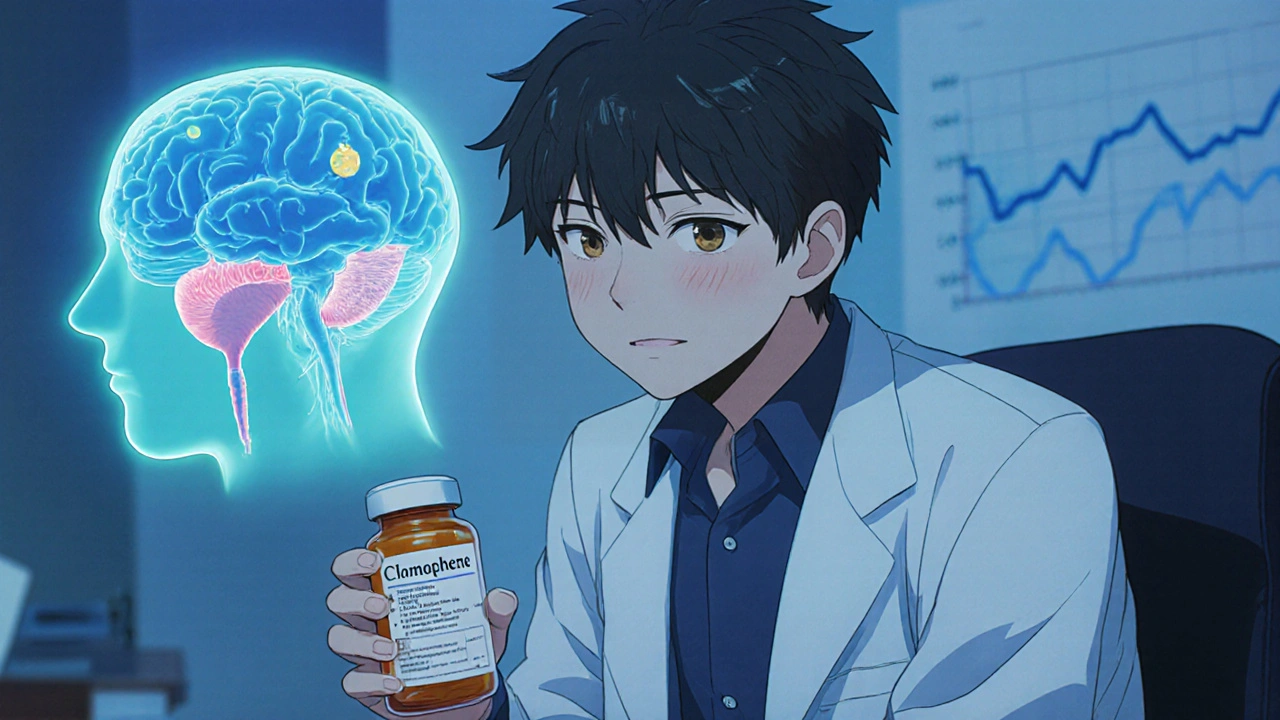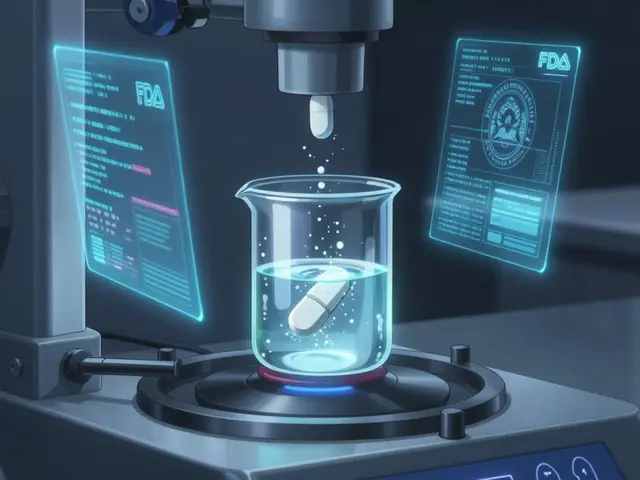Most men don’t expect to hear they have infertility issues-especially when they feel healthy. But low sperm count, poor motility, or low testosterone can sneak up quietly. And when standard treatments fail, some doctors turn to a drug originally designed for women: clomiphene. It’s not FDA-approved for men, but it’s been used off-label for decades. So what’s the real story? Does clomiphene actually help men get their partners pregnant?
How Clomiphene Works in Men
Clomiphene citrate, sold under the brand name Clomid, blocks estrogen receptors in the brain. That tricks the pituitary gland into thinking estrogen levels are too low. In response, it pumps out more follicle-stimulating hormone (FSH) and luteinizing hormone (LH). For men, LH tells the testes to make more testosterone. FSH tells them to make more sperm.
This isn’t just theory. A 2018 study in the Journal of Urology tracked 127 men with low sperm counts who took clomiphene for six months. Over 70% saw a rise in testosterone levels. Nearly half saw a significant jump in sperm concentration-some from under 5 million sperm per milliliter to over 15 million. That’s the difference between being classified as infertile and having a realistic shot at natural conception.
Why Doctors Prescribe It Off-Label
Clomiphene isn’t approved for male infertility because the FDA never required large-scale trials for that use. But that doesn’t mean it’s ineffective. In fact, many reproductive endocrinologists prefer it over testosterone replacement therapy (TRT) for men who still want to have children.
Why? Because giving men external testosterone shuts down their own natural production. It’s like turning off a faucet and expecting water to keep flowing. Clomiphene, on the other hand, wakes up the body’s own system. It doesn’t replace hormones-it restarts them. That’s why it’s often the go-to for men under 40 who have low testosterone but still want to preserve fertility.
Who Benefits the Most?
Not every man with low sperm count will respond. Clomiphene works best for those with hypogonadotropic hypogonadism-a condition where the brain doesn’t send the right signals to the testes. These men often have normal testicle size, no history of injury, and no genetic disorders like Klinefelter syndrome.
Men with high estrogen levels also tend to respond well. High estrogen can come from excess body fat, certain medications, or even environmental toxins. Clomiphene helps rebalance that ratio. One 2021 study found that men with a testosterone-to-estrogen ratio below 10:1 saw the biggest improvements in sperm count after taking clomiphene for 3-6 months.
On the flip side, men with damaged testes, varicoceles that weren’t fixed, or genetic causes of infertility usually won’t see much benefit. Clomiphene doesn’t fix broken hardware-it just turns up the signal.

What to Expect on the Treatment
Dosing varies, but most men start with 25 mg every other day. Some doctors go as high as 50 mg daily, but that increases side effect risk. Treatment usually lasts 3 to 6 months. Sperm production takes about 74 days from start to finish, so rushing the process doesn’t help.
Side effects are usually mild: mood swings, hot flashes, or slight vision blurring. Less than 5% of men stop because of them. A rare but serious risk is visual disturbances-if you notice floaters, blurred vision, or flashes, stop taking it and get checked immediately.
It’s not a magic pill. You won’t see results in two weeks. But if you’re patient and consistent, many men report improved energy, libido, and mood within the first month-before sperm counts even start to climb.
How It Compares to Other Treatments
Let’s say you’re comparing options:
| Treatment | How It Works | Improves Sperm Count? | Boosts Testosterone? | Preserves Fertility? |
|---|---|---|---|---|
| Clomiphene | Stimulates brain to release FSH and LH | Yes, in 40-60% of cases | Yes | Yes |
| Testosterone Replacement (TRT) | Directly adds external testosterone | No, often lowers it | Yes | No |
| HCG Injections | Mimics LH to stimulate testes | Yes, but less reliably | Yes | Yes |
| Letrozole | Blocks estrogen production | Yes, similar to clomiphene | Yes | Yes |
Clomiphene and letrozole are the only oral options that boost both sperm and testosterone without harming fertility. HCG works well but requires daily injections. TRT is the most popular-but if you want to have kids, it’s the worst choice.
Real-Life Results
Mark, 34, from Chester, started clomiphene after two years of trying to conceive. His sperm count was 3 million/mL, motility at 12%. He took 25 mg every other day for five months. His third semen analysis showed 18 million/mL and 35% motility. His wife got pregnant naturally the next month.
James, 41, had low testosterone (280 ng/dL) and no sperm in his ejaculate. His doctor ruled out blockages and genetic causes. After six months on clomiphene, his testosterone rose to 580 ng/dL, and sperm returned in his sample. He went on to IVF with ICSI and now has a daughter.
These aren’t outliers. A 2023 meta-analysis of 14 studies found that clomiphene improved sperm parameters in 58% of men with unexplained infertility. Pregnancy rates in couples using it were 22% over 12 months-comparable to intrauterine insemination (IUI) without drugs.

When It Won’t Work
Clomiphene won’t fix everything. If you’ve had testicular cancer, radiation, or mumps orchitis, your sperm factories may be permanently damaged. If you’re obese and have high estrogen from fat tissue, you’ll need to lose weight first-clomiphene can’t outwork a bad lifestyle.
It also doesn’t work for men with high FSH levels. That’s a red flag: your testes are already screaming for help, but the signal isn’t getting through. In those cases, direct injections like HCG or FSH may be better.
And if you’re expecting quick results-don’t. You need at least three months to see any change. Six months is the sweet spot. Anything less is a waste of time and money.
What to Do Next
If you’re considering clomiphene:
- Get a full fertility workup: semen analysis, testosterone, estradiol, FSH, LH, prolactin.
- Rule out structural issues: ultrasound for varicoceles, genetic testing if sperm count is under 5 million.
- See a reproductive endocrinologist or urologist who specializes in male fertility-not just a general practitioner.
- Ask about baseline lab values and what targets you’re aiming for.
- Track progress with repeat semen analyses every 90 days.
Don’t buy clomiphene online. Dosage matters. Counterfeit pills are common. A legitimate prescription from a licensed provider ensures you’re getting the right formulation and monitoring.
Final Thoughts
Clomiphene isn’t a cure-all. But for the right man-with the right diagnosis-it’s one of the most effective, affordable, and non-invasive ways to boost fertility without surgery or IVF. It doesn’t promise miracles. But it does give many men back control over their reproductive health.
If you’ve been told your infertility is "unexplained," or that your testosterone is "low-normal," don’t give up. Clomiphene might be the missing piece.
Is clomiphene safe for long-term use in men?
Clomiphene has been used safely in men for over 20 years. Most studies show no major risks with use up to 12-18 months. Long-term data beyond that is limited, but no significant liver, kidney, or cardiovascular damage has been linked to it in clinical use. Regular monitoring of liver enzymes and vision is recommended.
Can clomiphene increase the chance of twins or multiples?
No. Unlike in women, where clomiphene can trigger multiple ovulations, men don’t ovulate. There’s no increased risk of twins or multiples from clomiphene use in men. The only way multiples could occur is if the female partner is also taking fertility drugs.
How long after stopping clomiphene do sperm levels drop?
Sperm counts usually remain elevated for 2-4 months after stopping clomiphene, then gradually return to baseline. That’s why many couples time conception attempts during or shortly after treatment. If you stop and pregnancy doesn’t happen within 6 months, further testing may be needed.
Does clomiphene work for men with normal testosterone levels?
Yes, if their sperm count is low. Some men have normal testosterone but low FSH/LH, meaning their brain isn’t signaling properly. Clomiphene can stimulate that signal. Studies show these men often respond just as well as those with low testosterone.
Is clomiphene better than letrozole for male infertility?
Both are effective. Letrozole may raise testosterone slightly more and has fewer side effects like mood swings. But clomiphene has more long-term data and is often cheaper. The choice often comes down to doctor preference and individual response. Some men switch between the two if one stops working.
Next steps: If you’re considering clomiphene, talk to a specialist. Bring your lab results. Ask about the expected timeline. And don’t rush-it’s not a sprint, it’s a marathon.








Hope NewYork
November 2, 2025 AT 23:41So let me get this straight - you’re telling me a drug made for women to get pregnant is now being shoved down men’s throats like it’s some miracle cure? And no one’s asking why Big Pharma doesn’t want us to know this is just a loophole exploit? This is why I don’t trust doctors anymore.
Bonnie Sanders Bartlett
November 4, 2025 AT 07:57I appreciate how clearly this breaks down the science. My husband tried this after 3 years of trying, and it actually worked. We didn’t need IVF. Just patience, a good doctor, and this pill. It’s not glamorous, but it’s real.
Melissa Delong
November 6, 2025 AT 05:21Clomiphene was developed by a pharmaceutical company with ties to the FDA. The fact that it’s ‘off-label’ is a red flag. They’re testing unapproved drugs on men because they can’t get approval for women anymore. This is corporate manipulation disguised as medicine.
Marshall Washick
November 7, 2025 AT 17:36I was skeptical at first. My testosterone was low, but I didn’t want to risk anything that could hurt my chances. I started clomiphene after reading this exact breakdown. Three months in, I felt more like myself - not just physically, but mentally. My wife and I got pregnant at month five. I didn’t tell anyone until it happened. It felt too personal to share until it worked.
Abha Nakra
November 8, 2025 AT 01:21As someone from India where fertility treatments are often out of reach, I’m glad this is being discussed openly. Clomiphene is affordable here - around $20 a month. We’ve seen great results in our clinic with men who have normal T but low sperm. It’s not magic, but it’s a tool. And tools matter.
Neal Burton
November 8, 2025 AT 22:27Let’s be honest - if you’re relying on a drug designed for women to fix your masculinity crisis, you’re already in deep trouble. This isn’t medicine. It’s psychological Band-Aid for men too lazy to lift weights, eat real food, or sleep more than four hours. The real problem isn’t your hormones - it’s your life choices.
Tamara Kayali Browne
November 9, 2025 AT 16:16Study sample sizes are too small. 127 men? That’s a convenience sample, not a representative cohort. Also, no mention of confounding variables - diet, stress, sleep, environmental toxins. The data is cherry-picked to support a narrative. This is pseudoscience dressed in lab coats.
Nishigandha Kanurkar
November 10, 2025 AT 01:52Wait… wait… wait. Clomiphene blocks estrogen? But estrogen is essential for bone density, brain function, and heart health! They’re turning off a vital hormone and calling it ‘treatment’? This is dangerous! What about the long-term effects on cognition? On mood? On prostate cancer risk? No one’s talking about this! Someone’s hiding something!
Lori Johnson
November 11, 2025 AT 09:39I’m so glad you wrote this. My brother tried this last year and didn’t tell anyone because he was embarrassed. Now he’s a dad. I cried when he told me. It’s not just about sperm counts - it’s about dignity. Men deserve to know they can fix this without giving up on their bodies.
Tatiana Mathis
November 13, 2025 AT 06:15There’s something deeply human about this whole topic - the quiet desperation of men who’ve been told they’re broken, the shame they carry, the fear that they’ll never be fathers. Clomiphene isn’t just a pharmaceutical intervention; it’s a quiet reclamation of agency. It doesn’t promise perfection, but it offers possibility. And in fertility struggles, possibility is everything. I’ve seen men who thought they’d never hold their child - and then, one day, they do. It’s not flashy. It’s not viral. But it’s sacred.
Michelle Lyons
November 14, 2025 AT 14:30Clomiphene is part of a larger agenda. The government and pharmaceutical companies are pushing this because they want to control population growth. If men can naturally conceive more easily, then fewer people will turn to IVF or adoption - and that means less control over the system. This is all a distraction. Watch the headlines - they’re never talking about the real causes.
Cornelle Camberos
November 15, 2025 AT 18:07It is imperative to underscore that the utilization of clomiphene citrate in the male population remains, by regulatory standards, an experimental modality. The absence of formal FDA approval for this indication constitutes a significant deviation from established medical protocol. One must exercise extreme caution, as the long-term somatic consequences remain empirically unquantified. One does not casually manipulate endocrine pathways without profound systemic implications.
joe balak
November 17, 2025 AT 06:20My count went from 2M to 17M in 5 months. No side effects. Wife got pregnant. Done. Thanks for the data.
Iván Maceda
November 19, 2025 AT 04:22🇺🇸 This is what real American medicine looks like - smart, affordable, and patient-centered. No fancy labs. No injections. Just science that works. We don’t need to copy Europe’s overpriced IVF culture. We fix problems here. Clomiphene? It’s American ingenuity. 💪